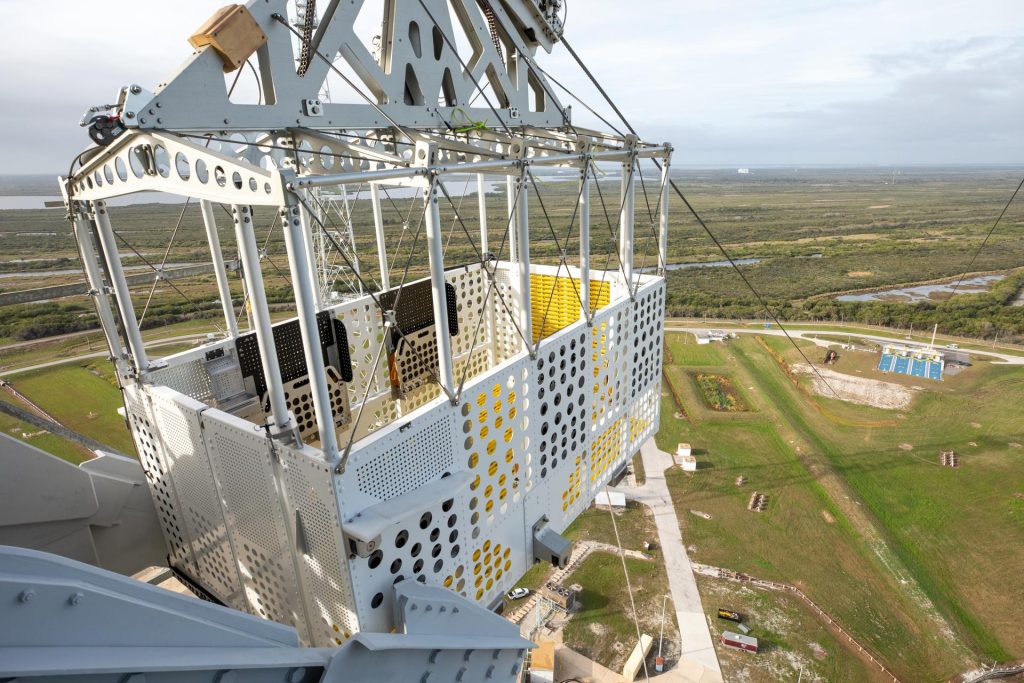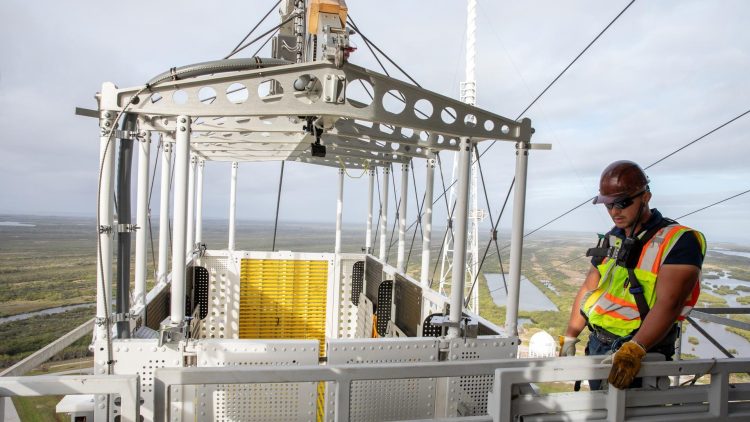NASA’s Artemis II mission, the first crewed mission in the Artemis program, represents a crucial step toward returning humans to the Moon and beyond. Ensuring the safety and reliability of the spacecraft is paramount, and as part of these efforts, NASA has undertaken a significant overhaul of the braking systems used in the Space Launch System (SLS) rocket. This article provides an in-depth look at the critical role of these brakes, the challenges faced during their upgrade, and the broader implications for the Artemis program.
1. The Artemis II Mission: A Milestone in Space Exploration
The Artemis II mission is set to be a historic event as it will be the first crewed mission of the Artemis program, NASA’s initiative to return astronauts to the Moon and establish a sustainable presence there. Scheduled for launch in the near future, Artemis II will mark a significant milestone in human space exploration, building on the achievements of the uncrewed Artemis I mission.
1.1 Mission Objectives
Artemis II aims to:
- Test Systems and Procedures: Validate the performance of the Orion spacecraft and its systems in a crewed environment, including life support systems, navigation, and communication.
- Orbit the Moon: Perform a lunar flyby, demonstrating the spacecraft’s ability to navigate and operate in deep space.
- Prepare for Future Missions: Lay the groundwork for subsequent Artemis missions, including the lunar landing missions that will involve astronauts setting foot on the Moon.
1.2 Significance of the Mission
The success of Artemis II is critical for the Artemis program’s objectives:
- Human Exploration of the Moon: Reestablishing human exploration of the Moon and preparing for long-term missions.
- Technological Advancements: Testing and validating new technologies that will be essential for future deep space exploration.
- International Collaboration: Strengthening partnerships with international space agencies and private sector partners.
2. The Importance of Braking Systems in Space Launch
Braking systems play a vital role in space launch vehicles, ensuring the safety of the spacecraft, crew, and mission. In the context of the SLS rocket and the Artemis missions, the braking systems are essential for managing various phases of the launch and flight.
2.1 Role of Brakes in the Space Launch System (SLS)
The SLS rocket, designed to be NASA’s most powerful rocket, incorporates advanced braking systems to manage different stages of the launch:
- First Stage Separation: The SLS rocket consists of multiple stages, with the first stage providing the initial thrust. After the first stage burns out, braking systems ensure a safe separation from the remaining stages.
- Solid Rocket Boosters: The SLS uses solid rocket boosters, which have their own braking mechanisms to control their separation from the core stage.
- Stage Separation and Fairing Jettison: The rocket needs to ensure smooth separation of stages and jettison of the fairing, which are critical for the efficient progression of the mission.
2.2 Safety and Reliability
The braking systems are designed to:
- Manage High Speeds: Handle the extreme speeds and forces experienced during launch and ascent.
- Ensure Safe Separation: Facilitate the safe separation of rocket stages and boosters, preventing collisions and ensuring that the remaining stages can continue their mission.
- Minimize Risks: Reduce the risk of malfunction or failure, which could jeopardize the mission and crew safety.

3. The Braking System Overhaul: A Detailed Analysis
NASA’s decision to overhaul the braking systems for the Artemis II mission reflects a commitment to ensuring the highest standards of safety and reliability. The overhaul process involves several key steps:
3.1 Identifying the Need for an Overhaul
The decision to update the braking systems stemmed from several factors:
- Performance Data: Analysis of performance data from previous missions and testing identified areas for improvement.
- Technological Advancements: Incorporation of new technologies and materials that offer enhanced performance and reliability.
- Safety Standards: Adherence to evolving safety standards and regulations to ensure the highest level of crew protection.
3.2 The Overhaul Process
The overhaul of the braking systems involves:
- Design Modifications: Engineering teams review and modify the design of the braking systems to address identified issues and incorporate new technologies.
- Component Replacement: Replacing or refurbishing critical components to ensure they meet the required performance standards.
- Testing and Validation: Rigorous testing of the updated braking systems to verify their performance under simulated launch conditions. This includes both ground-based tests and simulations to ensure reliability.
3.3 Challenges and Solutions
The overhaul process presents several challenges:
- Complexity: The braking systems are complex and require precise engineering to handle the extreme conditions of a space launch.
- Integration: Integrating the updated braking systems with the existing SLS infrastructure while maintaining overall system compatibility.
- Quality Assurance: Ensuring that the updated systems meet all quality assurance and safety standards.
To address these challenges, NASA employs a combination of advanced engineering practices, comprehensive testing, and iterative design improvements. Collaboration between engineering teams, quality assurance specialists, and mission planners ensures that all aspects of the braking systems are thoroughly evaluated and optimized.
4. Broader Implications for the Artemis Program
The successful overhaul of the braking systems for Artemis II has broader implications for the Artemis program and future space missions.
4.1 Enhancing Mission Success
The updated braking systems will contribute to:
- Increased Reliability: Improved braking systems enhance the overall reliability of the SLS rocket, reducing the risk of mission failure.
- Improved Performance: Enhanced braking mechanisms ensure that the rocket stages separate smoothly and efficiently, optimizing mission performance.
- Crew Safety: By addressing potential issues with the braking systems, NASA ensures the safety of the crew during the mission.
4.2 Supporting Future Missions
The advancements made during the overhaul process will benefit future Artemis missions and other space exploration endeavors:
- Technological Advancements: The updated braking systems incorporate cutting-edge technologies that can be applied to future missions.
- Operational Experience: The knowledge gained from the overhaul process provides valuable insights for the development and execution of future space missions.
- Collaborative Efforts: The successful implementation of the updated braking systems reflects the effectiveness of collaborative efforts between NASA, contractors, and international partners.
5. The Future of Space Exploration
The Artemis II mission and the subsequent Artemis missions represent a new era in space exploration, with the goal of expanding human presence beyond Earth. The advancements in technology, including the overhaul of braking systems, are crucial for achieving these goals.
5.1 Upcoming Artemis Missions
Future Artemis missions will focus on:
- Lunar Exploration: Establishing a sustainable human presence on the Moon and exploring its surface.
- Mars Missions: Preparing for crewed missions to Mars and other destinations in deep space.
- Technological Development: Continuing to develop and test new technologies that will support long-duration space missions.
5.2 Global Collaboration
The Artemis program emphasizes international collaboration and partnerships. By working with global space agencies and private sector partners, NASA aims to:
- Share Knowledge: Collaborate on scientific research and technological development.
- Promote Peaceful Exploration: Foster international cooperation in space exploration and ensure that space remains a domain for peaceful endeavors.
- Advance Space Science: Leverage global expertise to advance our understanding of space and its potential benefits for humanity.
5.3 Inspiring Future Generations
The Artemis program serves as a source of inspiration for future generations of scientists, engineers, and explorers. By showcasing the achievements and advancements in space exploration, NASA aims to:
- Encourage STEM Careers: Inspire young people to pursue careers in science, technology, engineering, and mathematics.
- Promote Space Education: Enhance educational programs and outreach initiatives to engage students and educators in space science.
- Foster Innovation: Stimulate interest in innovative technologies and solutions that can drive the future of space exploration.
6. Conclusion
NASA’s overhaul of the braking systems for the Artemis II mission reflects its commitment to ensuring the highest standards of safety and reliability in space exploration. The updates to the braking systems are crucial for the success of Artemis II and the broader Artemis program. By addressing the challenges and incorporating new technologies, NASA is paving the way for future missions and advancing humanity’s presence in space.
As the Artemis program progresses, the achievements and innovations made during the Artemis II mission will contribute to the long-term goals of lunar exploration, Mars missions, and beyond. Through global collaboration and continued advancements in technology, NASA aims to inspire and drive the future of space exploration, expanding our knowledge of the universe and exploring new frontiers.











































Discussion about this post